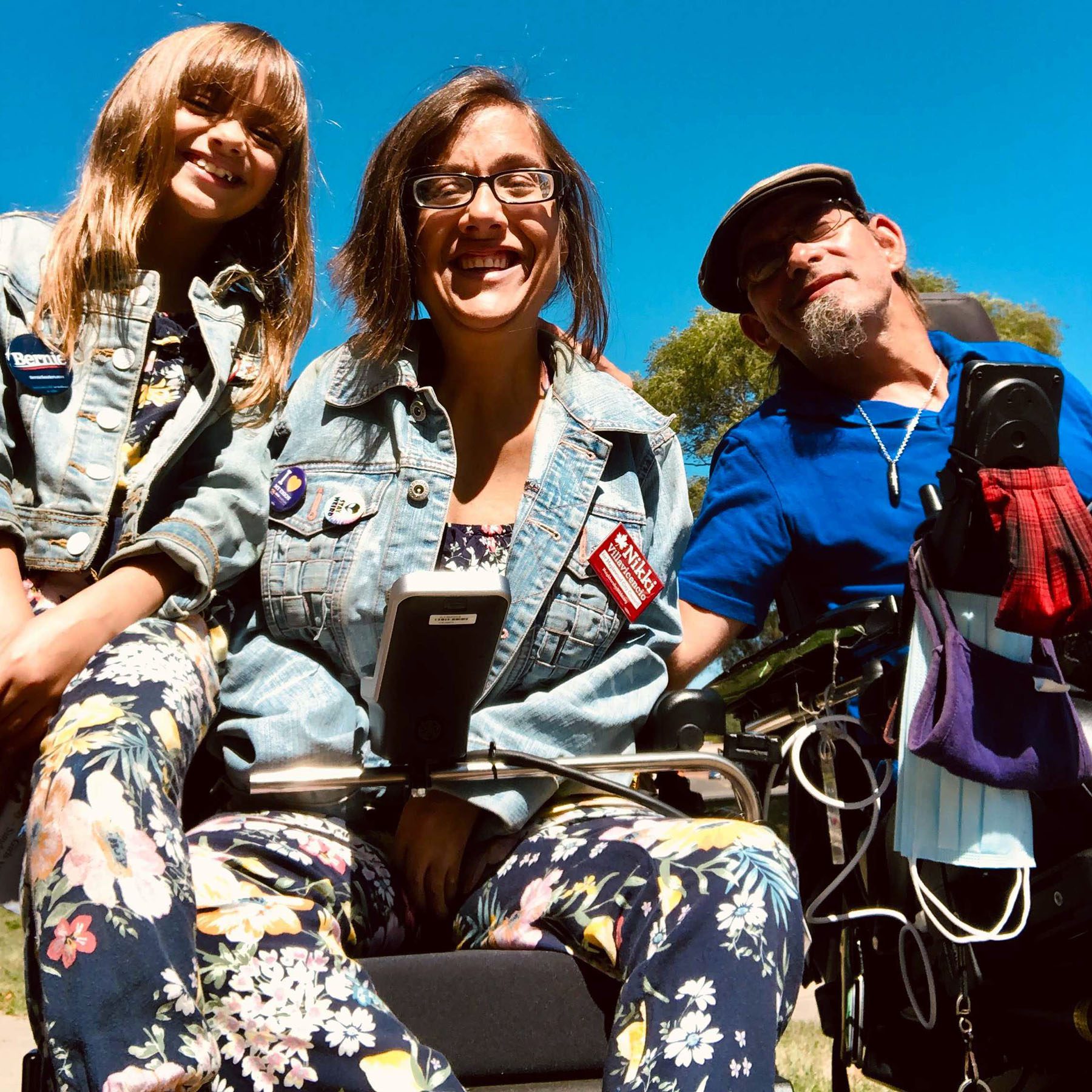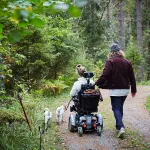Crystal Evans wants to wash her daughter’s hair. The problem is, she can’t use her home’s shower. Medicaid approved a bathroom modification in January 2020, but it didn’t include the shower portion, Evans said.
“The physical layout is a barrier. I can’t help Sophie without flooding the bathroom,” she said. “It’s really awkward and dangerous for me. I fall in there a lot.”
Evans, a single parent, has a neuromuscular disability. She uses a power chair and a ventilator and is unable to access much of her own home. Medicaid pays for a personal care assistant to come to her home every day, to help her with “activities of daily living” — preparing food for herself, for example. But help with parenting, according to state and federal law, is not covered.
“Technically, [personal care assistants] are not supposed to do anything for your child. If they do, they’re doing you a favor,” Evans said. “They’ll leave dishes they think I didn’t eat out of. They won’t help change her. They’ll only wash my laundry. The washer and dryer in my house are downstairs. How am I supposed to wash my daughter’s clothes?”
Her personal care assistants are technically prohibited from helping her with any parenting task. “It’s like [home care agencies] don’t want the child to exist,” Evans said.
According to a 2012 report from the National Council on Disability, an estimated 4.1 million parents in the United States have a disability.
“People don’t really expect disabled people to be parents,” said Robyn Powell, a law professor at Stetson University. Powell is principal author of the report and one of the foremost experts on parents with disabilities in the United States.
It isn’t clear how many people using home care services have parenting responsibilities — that data has not been collected. But Powell says that Evans’ situation is not at all uncommon. If the government pays for your personal care assistant, the assistant can’t help with tasks for anyone else in the house — and that includes parenting duties. That means sometimes parents will go to extremes to make sure their child is cared for.
“I’ve heard of parents that had their [personal care assistant] come in and make them a sandwich and leave, and the parent would give the sandwich to their child. They’d skip lunch every day to feed their child. It’s absurd to me,” Powell said.
According to Powell, many parents with disabilities are afraid to speak up about struggling to do everyday parenting tasks without assistance, afraid of being deemed unfit parents. These fears are not unfounded. Parents with disabilities are significantly more likely to lose their children to the child welfare system than the general population, according to the National Research Center for Parents with Disabilities.
According to Powell, solving the problem of assistance for parents with disabilities would be relatively simple: “All you have to do is add parenting as an instrumental activity of daily living [under the law].”
A recommendation for the Centers for Medicare and Medicaid Services (CMS) to expand what personal care assistants can do was made in 2012 by the National Council on Disability, an independent federal agency meant to advise the president and Congress on disability issues. However, the recommendation has not been adopted.
The move is “simple” because it is a regulatory change and would circumvent Congress and the legislative process, Powell said. “It’s as simple as anything involving the government is,” Powell conceded. It isn’t clear why the recommendation was never adopted. CMS did not comment in time for publication.
But though there has been no movement on the federal level, some states have started to accept these recommendations. Minnesota is one of the first to address the issue at a state level. In June, the state passed a pilot program as part of an omnibus health and human services bill. The provision would allow personal care assistants to do “supportive parenting services” like washing a child’s laundry, not just their client’s. The pilot program is set to begin in 2024 and will begin by funding research and a stakeholder group to evaluate the scope of the issue in the state.
Nikki Villavicencio is a Maplewood, Minnesota, city councilmember and one of the many parents with disabilities who advocated for the pilot program. She and her partner are disabled and use power wheelchairs to get around. Her daughter, Alexandria, is 8 years old and relatively independent, but when she was a baby, things were more difficult. Villavicencio and her partner had to make do. Villavicencio learned how to change diapers with her feet, since she has limited mobility in her arms.
Still Villavicencio and her partner needed more help and weren’t getting it. “The agency says [to staff], ‘You cannot hand the child a plate, you cannot cut up her food, you cannot do her laundry.’” she recalled.

They ended up relying on a complex and sometimes uncertain web of informal support. “My partner and I are very strong advocates and know how to speak up for ourselves. We’re highly engaged in our community. But not every disabled person has that,” Villavicencio said.
Though the program for now is just a pilot, Villavicencio is fiercely proud of the new law. “It’s going to set a precedent that parenting with a disability is a completely normal thing,” she told The 19th.
Villavicencio also stressed the importance of accessibility beyond home care. Adjustments to physical space can make a huge difference in independence. While Minnesota has a preexisting program to adapt people’s homes, it can be difficult to access. Villavicencio says it took four and a half years to get the modifications they needed to prepare food for themselves and their daughter without assistance.
“We have an accessible kitchen now. So when we don’t have care, we can at least feed ourselves,” she explained.
“It has nothing to do with whether a disabled person can or cannot parent,” Villavicencio continued. “Instead, it has to do with the environment that they’re in.”






